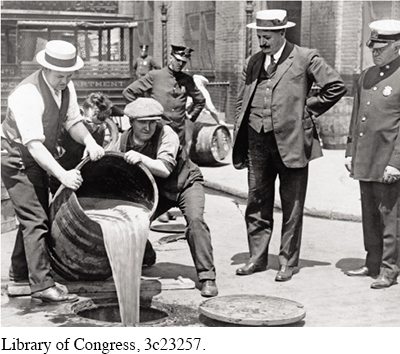The American Promise: Printed Page 656
The American Promise, Value Edition: Printed Page 599
The American Promise: A Concise History: Printed Page 682
Prohibition

Republicans generally sought to curb the powers of government, but the twenties witnessed a great exception to this rule when the federal government implemented one of the last reforms of the Progressive Era: the Eighteenth Amendment, which banned the manufacture and sale of alcohol and took effect in January 1920 (see “The Progressive Stake in the War” in chapter 22). Drying up the rivers of liquor that Americans consumed, supporters of prohibition claimed, would eliminate crime, boost production, and lift the nation’s morality. Prohibition would destroy the saloon, which according to a leading “dry” was the “most fiendish, corrupt and hell-
The American Promise: Printed Page 656
The American Promise, Value Edition: Printed Page 599
The American Promise: A Concise History: Printed Page 682
Page 657The Treasury Department agents charged with enforcing prohibition faced a staggering task. Although they smashed more than 172,000 illegal stills in 1925 alone, loopholes in the law almost guaranteed failure. Sacramental wine was permitted, allowing fake clergy to party with bogus congregations. Farmers were allowed to ferment their own “fruit juices.” Doctors and dentists could prescribe liquor for medicinal purposes.
In 1929, a Treasury agent in Indiana reported intense local resistance to enforcement of prohibition. “Conditions in most important cities very bad,” he declared. “Lax and corrupt public officials great handicap . . . prevalence of drinking among minor boys and the . . . middle or better classes of adults.” The “speakeasy,” an illegal nightclub, became a common feature of the urban landscape. Speakeasies’ dance floors led to the sexual integration of the formerly all-
The American Promise: Printed Page 656
The American Promise, Value Edition: Printed Page 599
The American Promise: A Concise History: Printed Page 682
Page 658Eventually, serious criminals took over the liquor trade. During the first four years of prohibition, Chicago witnessed more than two hundred gang-
Americans overwhelmingly favored the repeal of the Eighteenth Amendment, the “noble experiment,” as Herbert Hoover called prohibition. In 1931, a panel of distinguished experts reported that the experiment had failed. The social and political costs of prohibition outweighed the benefits. Prohibition fueled criminal activity, corrupted the police, demoralized the judiciary, and caused ordinary citizens to disrespect the law. In 1933, the nation ended prohibition, making the Eighteenth Amendment the only constitutional amendment to be repealed.